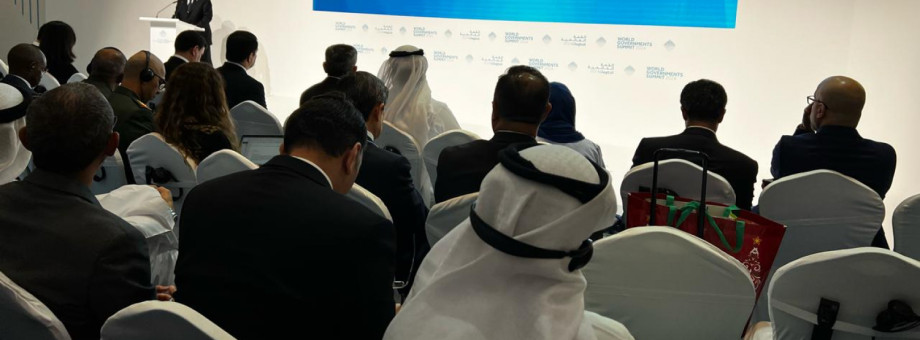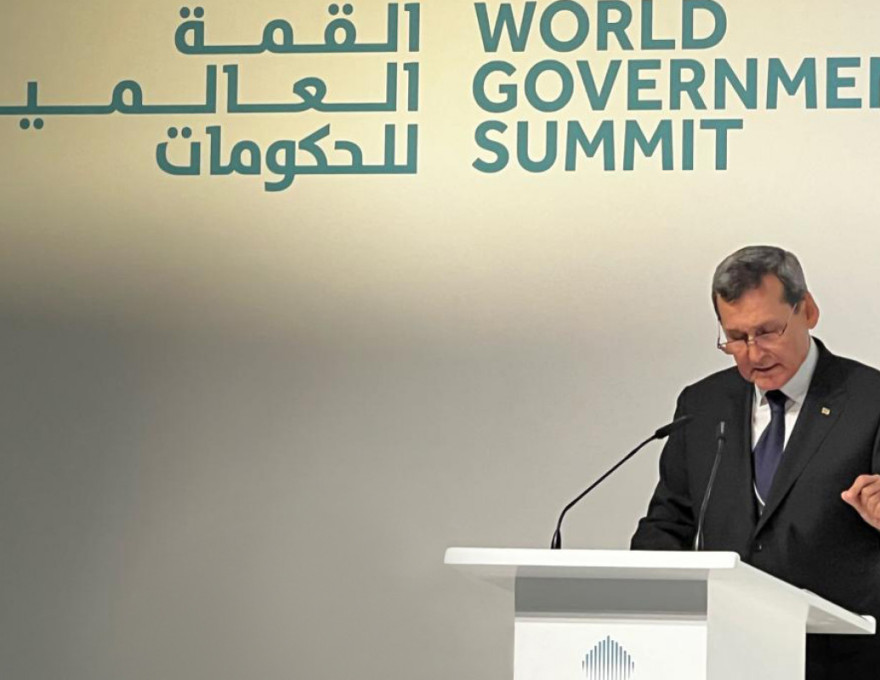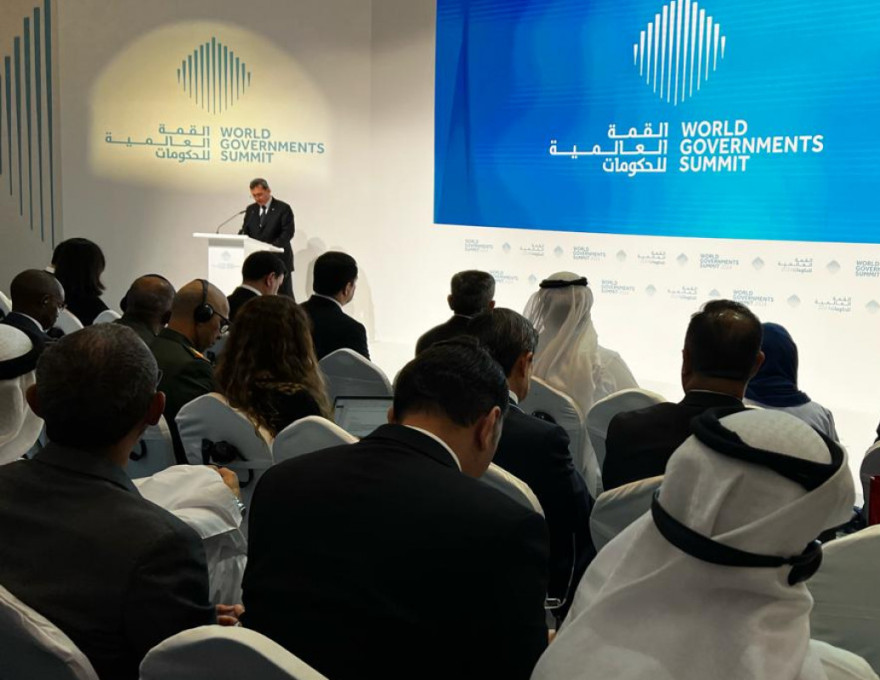STATEMENT of the delegation of Turkmenistan at the World Governments Summit (Dubai, February 12, 2024)
Excellencies,
Ladies and gentlemen,
First of all, let me express my gratitude to the leadership of the United Arab Emirates and all the organizers of the World Government Summit for the invitation and the favorable conditions created for productive work.
Today, more than ever, the international community requires determination, energy and foresight in making decisions aimed at ensuring stability and resilience during this difficult period, overcoming new serious challenges and threats.
In this regard, Turkmenistan, as a responsible member of the international community, clearly formulates and implements its approaches and actions, outlining priorities according to which the contribution of our country would facilitate the speedy achievement of global goals.
Among such priorities, we highlight transport connectivity and sustainability.
The development of sustainable transport systems, logistics interconnectivity, and the construction of a reliable transport and communication infrastructure at the global level that are of particular importance in the context of the global transformation of the economy.
In recent years, the international dialogue on this important aspect of sustainable development has become active at the United Nations.
At the initiative of Turkmenistan, six UN General Assembly resolutions on sustainable transport have been adopted over the past decade.
In November 2016, the first United Nations Global Conference on Sustainable Transport was held in the capital of Turkmenistan, which resulted in the adoption of the Ashgabat statement on commitments and Policy Recommendations.
At the same time, within the framework of the UN Global Transport Forum, a new mechanism for international interaction was established, which was entitled as the Ashgabat Process on Sustainable Transport.
Advancing international engagement in the transport and logistics sector, today we propose the initiative to create the Global Atlas of Sustainable Transport Connectivity.
Its main elements should include:
- multi-stakeholder partnerships involving governments, international organizations, research institutions, the private sector and civil society, to identify and implement a clear sequence of long-term joint practical steps;
- an open data platform facilitating the exchange of critical information, combining various sources;
- continuous analysis of information and development on its basis of mutually agreed solutions at the intergovernmental level.
The next important priority for sustainable development in the context of transition economies is energy sustainability.
Just recently, on January 26, the world community for the first time celebrated the International Day of Clean Energy, proclaimed by the UN General Assembly at the initiative of the United Arab Emirates.
Let me congratulate the leadership of the Emirates on this notable diplomatic victory and a significant step for global sustainable development.
Stable and reliable energy connectivity is one of the main priorities of Turkmenistan’s international activities. This is evidenced by three resolutions of the United Nations General Assembly on energy sustainability, initiated by our country.
One of the horizontal elements across the entire spectrum of promoted multilateral initiatives in the field of modern energy, and a key condition for their successful implementation, is, above all, the security and stability of energy supply.
In this regard, in the near future, at the global level, it is necessary to concentrate efforts aimed at solving the following tasks:
- first, - the creation of a new international platform for cooperation between governments, energy companies and financial institutions;
- second, - ensuring the exchange of best practices on energy risk management;
- third, - development of effective tools to address global and regional disruptions in energy supplies;
- fourth, - to stimulate joint investments in strategic energy infrastructure projects of international significance;
- fifth, - promote the creation of transparent and competitive energy markets.
Following these goals and objectives, Turkmenistan invites the governments of interested countries to establish a Global Energy Security and Sustainability Cooperation Alliance.
The main principle of partnership within such an Alliance, in our view, should be the indivisibility and interrelated nature of goals to ensure access to affordable, reliable, sustainable, and modern energy sources for all.
Ladies and Gentlemen,
The success of sustainable development largely depends on our ability to renew economic approaches across national, regional and global levels.
It is important to emphasize that sustainable transformation of global development is impossible without the creation of regional and national circular economic models.
In particular, special emphasis is placed on this within the framework of the global campaign initiated at the United Nations in December 2022 to achieve zero emissions goals.
With the rapid growth of the world’s population and the current volume of municipal solid waste, the main task of national governments is to manage the available natural resources while minimizing the impact on the environment.
This requires consolidation of efforts and approaches at the interstate level, which will allow us to consider the circular economy not just as a concept, but as a collective action toward a global structural transition to saving consumption models to preserve the sustainable development for future generations.
In this regard, Turkmenistan proposes to develop a Global Circular Economy Transition Framework based on the priorities of the 2030 Agenda for Sustainable Development.
Such a Framework Program is likely to have four key elements:
- first element, is common standard indicators and reporting. This includes a universal denominator for measuring resource consumption, waste generation and progress towards a circular loop, which will let Governments track and compare outcome results;
- the second element is International cooperation on Critical Resources. This involves a multilateral partnership in the exploration, production and processing of limited resources such as rare-earth metals. Such cooperation is intended, primarily to ensure responsible sourcing and minimize environmental damage;
- the third element is the establishment of a Global Circular Technology Innovation Fund. It can become a basis for investing in circular technologies in various sectors of the economy;
- fourth element, is capacity-building and knowledge Sharing. It is important to note that empowering developing countries through the exchange of experience and the development of national competencies should ensure their equal participation in global processes of building a circular economy.
Ladies and gentlemen,
In conclusion, I would like to encourage all participants of the World Government Summit to consider the above-mentioned initiatives of Turkmenistan, aimed at creating new framework for multilateral cooperation in building a sustainable global economy of the future.
Thank you for your attention.


 HABARLAR
HABARLAR



